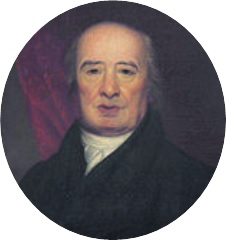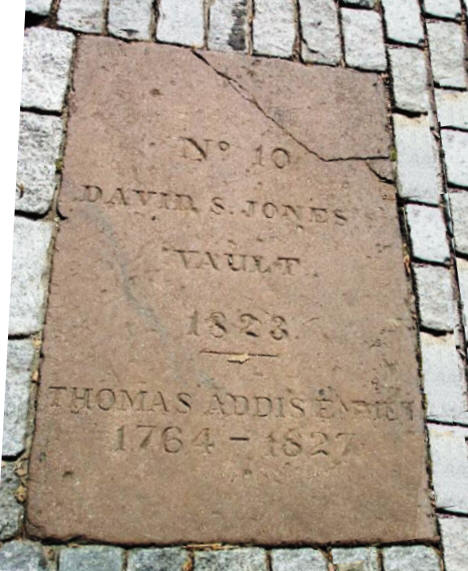Thomas Addis Emmet (1764 - 1827)
United Irishman, Lawyer, Political prisoner, New York State Attorney General
 Thomas Addis Emmet was born in Cork City
on April 24, 1764. He was the
second son born to Dr Robert Emmet
and Elizabeth Mason from Co.
Kerry.
Thomas Addis Emmet was born in Cork City
on April 24, 1764. He was the
second son born to Dr Robert Emmet
and Elizabeth Mason from Co.
Kerry.
Dr Emmet was a prominent member of the Anglo-Irish Protestant Ascendency(1). He was a specialist in fevers who worked among the poor people of Cork before being appointed State Physician and moving to Dublin. Amongst his duties as State Physician was to attend to the medical needs of the Lord Lieutenant of Ireland and to members of the British Royal Family on their visits to Ireland.
The wealth and privilege afforded the Protestant Ascendancy was at the expense of the native catholic population. The bulwark of the Ascendancy was the Irish parliament. It was sectarian in its makeup and by law subservient to the British parliament in London. Nonetheless, not all parliamentarians or others who benefited were comfortable with a sectarian parliament whose avowed purpose was to enslave the native majority in order to enrich and perpetuate the Ascendancy.
One such grouping was the Irish Patriot Party consisting of Irish parliamentarians, originally led by Henry Flood and later by Henry Grattan. They campaigned for legislative reform and independence within the existing framework. They were not interested in Irish independence.
Dr. Emmet, who advocated for Catholic Emancipation and legislative reform, supported in principle the aims of the Patriot Party. However, his progressive and outspoken views on discrimination and class distinction made him unpopular not only with the British administration in Ireland, but also with some Irish parliamentarians. In derision Henry Grattan referred to him as the ‘man with the pill and a plan'. There is no doubt that his tenacity, courage and outspoken views instilled in his offspring's the seeds of patriotism and rebellion.
As was the prerogative of the privileged at that time, Emmet received the best education available. From all accounts he was an exceptionally talented student, who after completing his primary education at a private school in Cork entered Trinity College Dublin in 1781 on a scholarship. He graduated from there in 1783 with a Bachelor of Arts degree. Having chosen medicine as a carrier he entered the University of Edinburgh whose medical school was renowned for it's world class curriculum and from whence he received the degree of Doctor of Medicine in 1784. After receiving his medical degree he attended other medical colleges in Germany, France and Italy before returning home to Ireland in 1788.
On the death of his older brother Christopher, a practicing barrister, he decided to forego the practice of medicine for a career in law. From 1788 to 1790 he studied law at the Temple in London. He was admitted to the Irish bar in 1790 and immediately afterwards started practicing law, primarily as counsel to prisoners charged with political offenses. One of his first cases in which he distinguished himself was that of Napper Tandy who was indicted for 'challenging and provoking to fight, John Toler" John Toler was the Attorney General who made a derogatory remark about Tandy's visage. Tandy was acquitted.
During his time in Ireland as a defense barrister he served alongside such legal luminaries as John Philpot Curran, the brothers Henry and John Sheares, and Leonard McNally all of whom were members of the Society of United Irishmen.
In 1791 he married Jane Patten the daughter of the Rev. John Patten of Clonmel in Tipperary with whom he had ten children.
In the fall of 1791, Theobald Wolfe Tone, Thomas Russell, Henry Joy McCracken and William Drennan founded the Society of the United Irishman (Society) in Belfast to pursue reform of the Irish parliament by uniting Protestant, Catholic and Dissenter into a single movement. Shortly after the Society was founded in Belfast, Napper Tandy, William James MacNeven and others activists founded a branch in Dublin. Emmet became the Society legal adviser.
Around the same he joined the Catholic Committee whose objective was to safeguard Catholic interests and obtain a relaxation or repeal of the Penal Laws
Although he lived in Dublin he followed the Circuit Court to the various locations where the court sat to represent his clients. During these trips, unbeknownst to everyone except for Wolfe Tone a few other senior members of the Society, he was busy organizing branches of the Society despite not being a member.
In order to counter a potential threat from the expanding ranks of the Society of the United Irishmen the British parliament enacted a series of Catholic Relief Acts in 1792 and 1793 that granted limited rights to 'educated Catholics'. Fearful of any relaxation of the Penal Laws the Ascendancy dominated Dublin Corporation passed a declaration imploring King George III to "preserve the Protestant ascendancy in Ireland inviolate". The Society tasked Emmet with developing a non-sectarian manifesto rebuking the Corporation self serving, myopic and callous declaration.
In conjunction with the Catholic Relief Acts of 1792/3 the British parliament enacted other laws to curtail any ensuing challenge to their rule. These other laws included provisions to handle unlawful assemblies and the importation of arms. The also included the legitimization of unfettered searches by magistrates whenever or wherever they pleased. To insure compliance they increased the size of the standing army and for good measure planted paid informers within the ranks of the Society.
These countervailing acts and actions rendered the Catholic Relief acts inconsequential and caused a shift within the leadership and ranks of the Society's from a position of political pressure to that of armed confrontation
In 1795, Emmet took the Society's oath in open court to attest to its legitimacy when defending individuals charged with administering the same oath to others. After that he considered it prudent to refrain from defending other Society members who could be further harmed by his open act of defiance. However, he continued to act as their legal adviser.
By 1796 the Society was outlawed, reorganized as a secret society and committed to Ireland's total separation from Britain. By then Emmet had became more active in its' affairs, first as its Secretary and in 1797 when Arthur O' Connor was arrested took his place on the Directory. Leading up the Rising in 1798 he was one of the leaders who countenanced for patience until French help assured. Afterwards Emmet admitted that waiting for French help was flawed , and that Napoleon was the "worst enemy Ireland ever had."
On March 12, 1798 Emmet and fifteen others members of the Leinster Directory were arrested on information provided by the informer Thomas Reynolds. Emmet was questioned at Dublin Castle, the headquarters of the British administration in Ireland, before being lodged in Newgate prison and later in Kilmainham.
In the aftermath of the failed Rising (May through September 1798) Emmet and other arrested leaders entered an agreement with the British Government wherein they would disclose the workings of the Society without divulging names or implicating others on condition that 1) the Government stop the wholesale executions taking place throughout Ireland and 2) allow him and his companions to leave the country preferably for America. During his ensuing examination before the Parliamentary Committee he defended the policies of the United Irishmen stating that revolution was inevitable after the rejection of the Irish peoples demand for meaningful parliamentary reform and equal rights for catholic.
When the American minister to England, Rufus King, the son of a Loyalist, objected to the deportation of Emmet and his compatriots to the United States the British government sent them to Fort George in Scotland where they remained until their release in March of 1802 after the Treaty of Amiens was signed. During the next two years Emmet traveling and residing in various locations throughout Europe including Hamburg, Brussels and Paris. In December of 1803 he met with Napoleon to plead for French support for another Rising in Ireland. Initially Napoleon agreed but by April 1804 he had other plans that did not include Ireland.
Accepting the reality that another Irish Rising was not possible, coupled with the sad reality that his parents and siblings were all deceased, he and his family departed France for the United States in October of 1804, choosing New York as his new home. His deceased brother, Robert, was executed, drawn and quartered for his role in the Rising of 1803.
Emmet's life in the United States was a rewarding and fulfilling experience. He joined the New York bar and established a law practice that became one of the best known and successful law practices in New York City. On the death of the New York State Attorney General, in 1812 Emmet was appointed to fill the post until the opposing Federalist Party obtained a majority in the Council of Appointment in 1813 and replaced him with their own man. He was highly regarded by his collogues and praised for his legal abilities by Joseph Story a United States Supreme Court Justice who declared him to be "the favorite counselor of New York".
He worked hard -- enjoyed the freedom America afforded and found solace and companionship in the company of many of his old friend from his revolutionary days in Ireland.
His embittered attitude towards Ireland's landed gentry and those other privileged classes who did the Kings bidding on the backs of the poor and enslaved native Irish was best summed up in the following extract from a letter he wrote to a friend who suggested he revisit Ireland;
"I am too proud, when vanquished, to assist by my presence in gracing the triumph of the victor; and with what feelings should I tread on Irish ground? As if I were walking over graves — and those the graves of my nearest relations and dearest friends. No; I can never wish to be in Ireland, except in such a way as none of my old friends connected with the Government could wish to see me placed in. As to my children, I hope they will love liberty too much ever to fix a voluntary residence in an enslaved country."
On November 14, 1827 Thomas Addis Emmet had an apoplectic seizure while conducting a case in the United States Circuit Court of New York . He died later that day at his home. He is buried in St Mark's-in-the-Bowery Churchyard in the East Village, New York City.
Notes:
The Protestant Ascendancy was the political, economic, and social domination of Ireland by a minority of landowners, Protestant clergy, and members of the professions, all members of the Established Church of Ireland or Church of England from 1691 through the 1920's.
Contributed by; Tomás Ó Coısdealha
Cemetery AND grave location
Name: Saint Mark's Church-In-The-Bowery Graveyard PHONE NO. (212) 533-4650
ADDRESS: 131 E 10th St, New York, NY 10003
GRAVE


